How to speed up Ubuntu system
In this tutorial, TipsMake will show you how to speed up Ubuntu. The Ubuntu operating system is based on the Linux kernel which is free and open source software, which means that the code used is available online for others to use and review. Canonical, the lead developer of Ubuntu, works with the Linux Community to ensure the operating system is as efficient as possible.
However, over time the Ubuntu installation can become slower. This could be due to a small amount of free disk space or low virtual memory (most likely because of the number of programs you have downloaded).
In this guide on how to speed up Ubuntu, you will discover 10 best tips to ensure the best performance of Ubuntu system.
1. Restart the computer

While this may seem like an obvious thing, many users leave their machines idle for weeks at a time. Although your monitor may automatically go to sleep, any running processors will continue to work. This means that over time they can build up and slow down your computer.
An easy way to speed up Ubuntu is to shutdown it every day after you're done using it. Try to close all running programs and save any open files before you turn off your computer. If your computer is running so slow that you can't even access the Ubuntu system menu to shutdown, hold down your machine's power button until it shuts down completely.
2. Always keep Ubuntu up to date

Canonical is constantly releasing updates for Ubuntu, and these updates are designed to fix common bugs that degrade system performance. Some of these updates are quite minor, while others, such as a new version of Ubuntu, are released twice a year and make significant changes to the system and maximize performance. fruit.
To search for and apply updates, open Linux Terminal and type:
sudo apt-get updateTo check if a major upgrade is available, open Terminal and run the command:
sudo apt-get upgradeTerminal will then prompt you to press Y to continue.
Be sure to save any open files and run a full system backup before doing this.
3. Use lightweight desktop alternatives

The standard version of Ubuntu uses the GNOME desktop designed to strike a balance between smooth graphics and resource efficiency. If you have an older computer, it may struggle with some of the more advanced features.
Fortunately, there are lightweight desktop alternatives available for Ubuntu. One of the best known options is Lubuntu, which is based on the super efficient LX desktop environment.
To get started, just open Terminal and type:
sudo apt-get install lubuntu-desktopOnce installed, you can load the Lubuntu desktop from the login screen by clicking the icon next to your name.
Alternatively, visit the Lubuntu homepage to download a prepackaged version of Ubuntu using this high-speed desktop environment. Lubuntu also comes with various applications that have been carefully selected for easy use of system resources.
4. Use an SSD
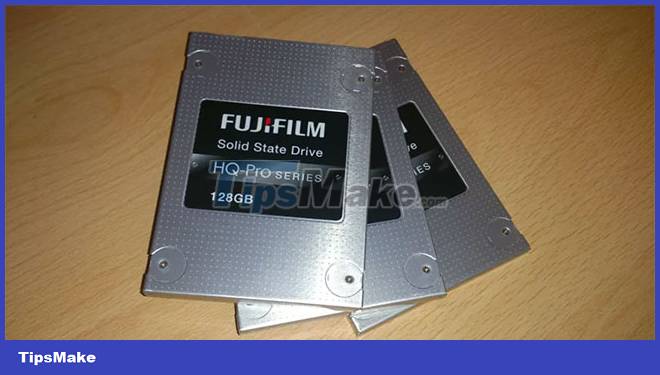
SSDs use flash memory, the same type found in USB. They allow for much faster write and access times than traditional mechanical hard drives that use magnetized drives.
SSDs tend to be more expensive per Gigabyte than regular hard drives but make for a much more efficient system if you're willing to cover the cost. If you want to buy an SSD to install yourself, make sure you have the correct dimensions for your machine (2.5 inches for mobile, 3.5 inches for desktop).
You can use free software like Clonezilla to copy stuff from your current hard drive to your new SSD. See TipsMake's guide on how to clone a hard drive with Clonezilla.
5. Upgrade RAM

?
The overall speed of a PC can be significantly improved by increasing the amount of virtual memory (RAM). Ubuntu requires at least 2GB of RAM to run smoothly, although this doesn't take into account resource-hungry applications like video editors and certain games.
The simplest solution is to install more RAM. Your PC has a certain number of RAM slots that you can put more RAM in. Search for your specific model to find out what type of RAM it uses, for example, DDR3.
To display the total amount of RAM available in Ubuntu, enter the following in the Terminal:
free ?mTo show RAM type and speed, use command:
sudo lshw -c memoryInstalling new RAM is pretty straightforward. If you're doing it yourself, use an anti-static wrist strap to avoid damaging delicate parts.
Also, many PC repair shops will gladly upgrade your hardware for a small fee.
6. Monitor Startup Applications
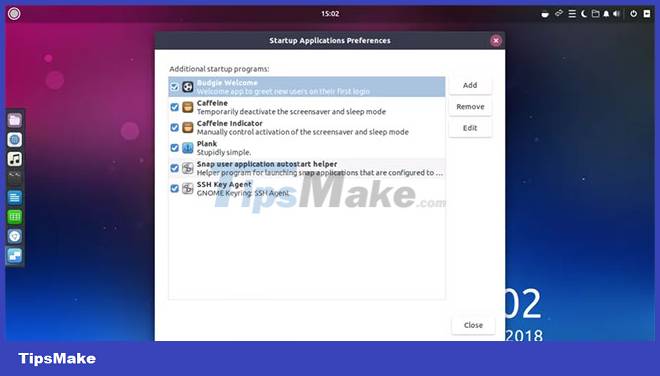
Linux aims to use your system memory as sparingly as possible. However, over time as you install more apps, your machine may slow down due to the number of apps trying to launch at login.
Ubuntu has a handy graphical application called Startup Applications. Launch it from the GNOME menu to see a full list. Use your mouse to click each application and select Remove to prevent the program from launching.
In Ubuntu, you can list any service launched at startup by opening Terminal and running the command:
service --status-allTo stop a running service, enter the command:
sudo service stopTo remove an existing program from Ubuntu, open Terminal and run:
sudo apt-get remove 7. Increase Swap space

If your Linux machine needs more resources than the amount of RAM you can give it, it can take advantage of Swap space, which can help speed up Ubuntu. In a word, this is the hard drive area that Linux uses exactly like RAM.
The Ubuntu installer will automatically assign a dedicated swap partition on the hard drive during setup. This is usually enough but you can increase its size using Ubuntu's default drive manager - GParted.
To get started, insert the latest Ubuntu DVD/USB into your machine and boot into the live environment. Open GParted from the GNOME menu. From here you can delete the existing swap partition and shrink your main partition.
Next, click Create a new partition to add a new, larger Swap space. If you need assistance using GParted, be sure to read the user manual carefully. The help section of the Ubuntu website also has detailed instructions.
Resizing a hard drive is risky if you're not a proficient user, so make a full backup of your data before proceeding.
8. Install Preload
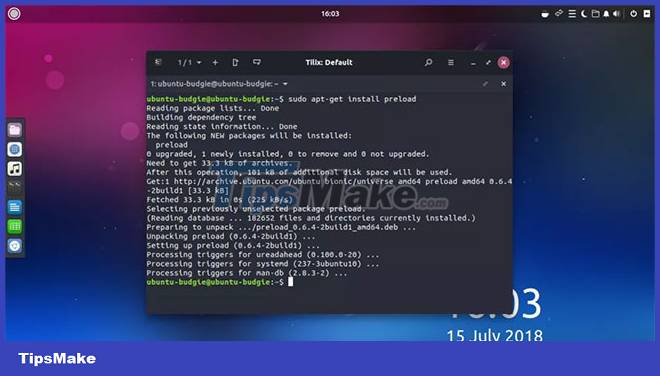
In computer jargon, preloading is the act of keeping necessary files in RAM. This is many times faster than putting files on the hard drive.
The preload daemon works by running in the background and keeping track of which apps you use most often. This gives the system a better picture of the programs you may need and ensures that they are the first to load at login, which greatly reduces startup times.
To get started, open Terminal and run the command:
sudo apt-get install preloadOnce the installation is done, just reboot and Preload will run in the background.
9. Use local mirrors
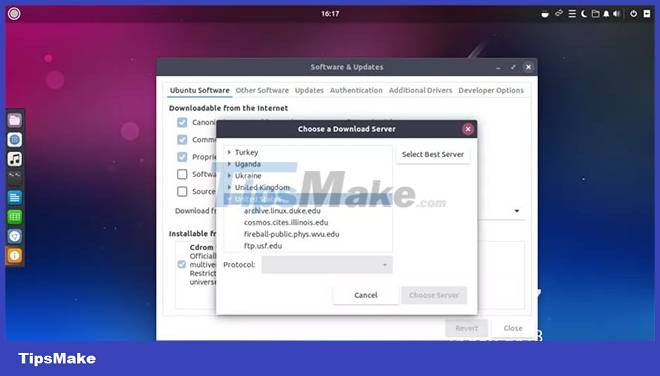
To get the best download speed when updating software, you should always use the mirror (server) as close to your location as possible. You should verify that you are using the most recent one. This is usually selected automatically for you during setup.
To change mirror settings, go to Software. Click the menu button at the top left of the screen and select Software and Updates > Ubuntu Software tab > Download From . From here, select Other and then choose the server closest to you.
10. Clean up old files
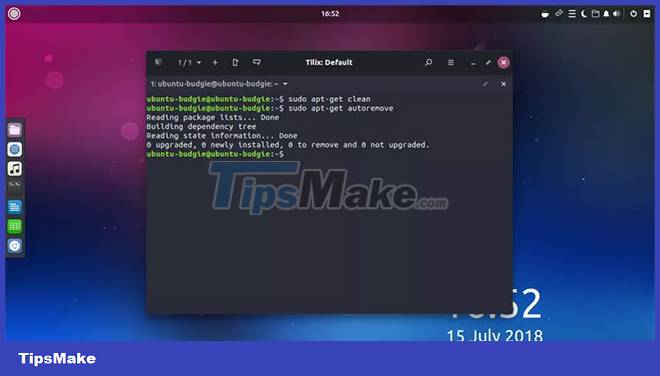
That's why the more free space you have on your hard drive, the fewer files Ubuntu has to deal with to find what you need. For this reason, you should delete any unnecessary files or programs.
Regarding files, the most common culprit is the Downloads folder because this folder usually only contains files from the Internet. It's usually safe to delete them since you can download them again.
To empty the temporary cache used by apt-get , run the command:
sudo apt-get cleanThis will not remove any actual applications.
While cleaning, you can also remove any unused packages and dependencies by opening Terminal and running:
sudo apt-get autoremove